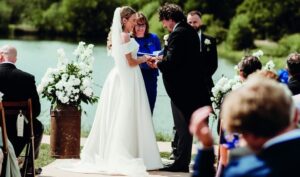What does “Unlicensed Wedding Venue” mean? By Anita Scott
What is an Unlicensed Wedding Venue?
Bedfordshire Weddings in “Unlicensed Venues” with me as your wedding celebrant
Wedding ceremonies that feel deeply personal, flexible, and full of meaning could be officiated with a celebrant-led ceremony in an unlicensed venue might be just the thing. As a wedding celebrant in Bedfordshire, I love working with couples who want the freedom to create a ceremony that is uniquely theirs, wherever their heart leads them.
In this post, I’ll walk you through what “unlicensed” means in this context, the kinds of venues people choose, how to include rituals and personal vows, and how to make the whole thing legally binding (if you want to) without losing any of the magic.
What Does “Unlicensed Venue” Mean?
In UK wedding law, certain venues hold a civil licence which allows legally binding marriages to take place there (with a registrar). An unlicensed venue is a place without that licence. That means your ceremony in that space will be symbolic or celebratory, beautiful and meaningful, but not legally binding on its own.
But that doesn’t mean it’s “not real”. Many couples have a symbolic wedding ceremony and then do the legal bit later, or before if that works better for you.
Examples of (or venues close to) Unlicensed Options in Bedfordshire/Milton Keynes
Here are a few real-life examples of venues (or kinds of places) that either are unlicensed or operate in a way where celebrant ceremonies are welcome (with the legal bit done elsewhere):
- Tip Top Venues -Located on an 800-acre working farm, in Milton Keynes, the focal point is our majestic tipis, standing tall amidst the lush landscape. Tip Top Venues
- The Lakeside at Wildberry Farm: This is currently not licensed for legal weddings, but many couples host their celebrant ceremonies here and then handle the paperwork at the registry. Wild Berry Farm
- Woodland Hollow Weddings, near Lidlington : A natural glade / meadow wedding site, often used as a blank canvas outdoors venue. theweddingsecret.co.uk
Pros & Cons of a Non-Legally Binding Ceremony

- Big flexibility in location, style, timing
- You’re free to design your own service (vows, rituals, structure)
- More emotional and memorable for many couples
- Couples and Guests alike, love the freedom and authenticity of the ceremony

- The ceremony itself is not legally recognised
- You must still do the legal formalities separately
- It’s an extra step and cost to make things official
How to Make It Legal (and Why You’ll Want To)
If you love the freedom of a celebrant ceremony in an unlicensed venue but also want your marriage to be legally recognised, here’s what to do:
- Register notice of marriage at your local registry office (this is required well in advance in most cases).
- Book a short legal ceremony (sometimes called a “2 + 2” in some areas) at the registry office with two witnesses.
- After that, your celebrant ceremony is purely symbolic, but totally your own, and your legal status is already taken care of.
- If your preferred licensed venue or date is unavailable, couples sometimes do the legal bit weeks or days before (or after) and then do the “real” ceremony on their preferred day.
This means your celebrant ceremony is the one people remember and talk about, but the paperwork ensures your marriage is official.
Contact me for a FREE – NO OBLIGATION TO BOOK – chat
